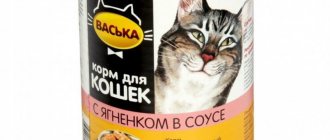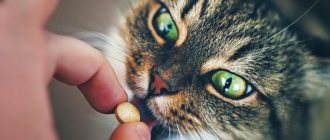Treatment of worms in cats is a mandatory measure. However, what should you do if traces of parasites are found in the feces of a pregnant cat? As you know, worms in a pregnant cat can threaten not only the expectant mother, but also the kittens.
According to generally accepted rules, treating worms in a pregnant cat is not recommended. So what should an owner do? Let's take a closer look at whether it is possible to give deworming tablets to a pregnant cat and which medicine to choose.
What to do in such a situation? To get started, we recommend reading this article. This article describes in detail methods of controlling parasites. We also recommend that you consult a specialist. Read the article >>>
How to find out if a pregnant cat has worms?
As a general rule, all pets should receive regular worm preventatives. Anthelmintic treatment is carried out regardless of the age, breed and lifestyle of the cat. Even if a cat never goes outside, she will become infected with worms, since their eggs and larvae are literally everywhere.
Before a planned mating, the male and female cat must be examined by a veterinarian for viruses and infections. Animals are required to be revaccinated and treated against parasites. Only healthy animals are allowed to breed. All these precautions are due to the fact that some types of parasites can penetrate the placental barrier or be transmitted to kittens through mother's milk.
Parasitology distinguishes three large families of worms that parasitize cats:
- Tapeworms, tapeworms or tapeworms are parasites that attach to the walls of organs using hooks, do not need a partner for reproduction, can live up to 5 years and grow up to one and a half meters in length. Cats are most often infected with cucumber tapeworm, the intermediate carrier of which is the flea. A cat becomes infected by swallowing fleas, biting fur, or trying to relieve the itching.
- Roundworms or nematodes are the most numerous and widespread family with a simple development and reproduction cycle. Infection occurs after ingestion of an egg or larva. Worms are localized in the small intestine, but some species can migrate to tissues and organs. During pregnancy, roundworm larvae migrate to the mammary glands, and when lactation begins, they infect kittens. A certain type of roundworm can penetrate the placental barrier, infecting kittens in utero. Intrauterine infection most often results in the birth of underdeveloped offspring and the death of kittens at an early age.
- Flatworms or flukes have a very complex development cycle and parasitize the tissues and internal organs of the animal. Intermediate carriers are most often fish, shellfish, worms and insects. Common types of flatworms that parasitize cats cause irreparable damage to the liver, gall bladder, spleen and pancreas. By the way, flatworms that parasitize cats can infect people, but a person cannot become infected from the cat itself.
Infection with worms is determined by symptoms and visual detection of parasites. In rare cases, you may notice living or dead parasites in vomit and feces. Small, white worms with rounded tips are roundworms or roundworms. These worms parasitize the intestinal lumen and multiply rapidly.
Symptoms of helminthic infestation are:
- Deterioration in wool quality, loss of shine, fragility and loss.
- Deterioration of skin quality, appearance of scales and dandruff.
- Restless sleep, decreased activity, apathy and weakness.
- Pain on palpation of the abdominal cavity or hypochondrium.
- Vitamin deficiency, weight loss, lack or perversion of appetite.
- Increased lacrimation.
- Looseness, inflammation and anemia of the mucous membranes.
- Unpleasant odor from the mouth.
- Nausea and vomiting.
- Incomplete digestion of food.
- Alternating constipation and diarrhea.
- Diarrhea with a lot of mucus.
- With liver damage, jaundice and increased blood creatinine levels.
- If the pancreas is damaged, digestive processes and hormonal imbalances occur.
Important! In the first stages, helminthic infestation is asymptomatic. Clear signs of malaise and intoxication appear within 2–3 months after infection.
Causes of helminth infection
Most often, animals become infected with eggs and larvae of the following helminths (worm-like parasites that live inside the host’s body):
- nematodes, roundworms (they have a round cross-section of the body), pinworms;
- cestodes (flat or tapeworms);
- whipworms;
- hookworms.
The etiology (causes and conditions) of the lesion is such that the eggs and larvae of helminths enter the cat’s body:
- with untreated thermally processed food (raw poultry, animal meat, sea and river fish);
- with dirty drink (unboiled milk, water from a puddle, river, lake);
- when communicating with a carrier - a person, an animal;
- through contaminated feces;
- with the help of ectoparasites (insect-like external bloodsuckers, for example, ticks, fleas);
- from street shoes, clothes, things and objects.
Worms also appear from intrauterine infection of kittens by their mother.
Important! Raw meat, even frozen or thoroughly washed, may contain eggs and larvae of worms. Very often, many breeds of river fish are infected with them. In her body, helminths usually mature.
What should you do if you find strange white specks in your cat's stool?
What to do if you find white spots in your pet’s stool? First, you need to figure out what exactly you see. Fragments of undigested food or inedible objects that the cat accidentally swallowed may come out with the feces.
Parasite eggs have a number of distinctive features:
- Oval in shape with a sharp tip, sometimes with a cap.
- Color: white, cream, gray or brown.
- With prolonged observation, you may notice that the parasite eggs move as they are located in the muscular bursa.
If all the signs match and you are sure that you are observing tape parasite eggs, contact your veterinarian immediately. Tapeworms can be easily removed from a cat's body using pyrantel, but it should not be used in the first half of pregnancy.
When is it necessary to worm?
It is not recommended to poison worms in a nursing cat or during pregnancy, but in exceptional cases deworming is simply necessary. It is necessary to treat a purr for worms in such an interesting situation if “uninvited guests” prevent the pets from living normally and raising future offspring. Therefore, it will be necessary to immediately remove worms from the body of your four-legged pets if the following negative changes are observed:
- the condition of the purr has noticeably worsened;
- lost interest in food;
- digestion is disrupted;
- helminths can be traced in the feces.
In addition, you will need to urgently deworm a pregnant cat that is suffering from a debilitating cough, and also if there is intense hair loss, increased lacrimation, skin itching and the animal, lying on the floor, crawls on the pelvic part, which indicates itching in the anal area. In addition, itchy discomfort in the anus can be caused by maggots, which are extremely rare in cats.
But it is impossible to independently determine the presence of worms and whether your pet needs to be wormed. Many of the listed signs can easily be confused with other pathologies, in particular, a lack of vitamins in the body, chronic intoxication and diseases of the internal organs.
Therefore, before starting treatment for a cat before birth and if a helminthic infestation is suspected, you need to show your four-legged pet to a veterinarian. An employee of the veterinary clinic will conduct the necessary laboratory tests and only after identifying the type of parasite, will he recommend how to remove them correctly so as not to harm the purr with the kittens inside.
Safe veterinary drugs
If it is necessary to deworm a pregnant cat, it is better to use the medical product Drontal. Its dosage depends on weight, so for purrs with a body weight of 4 kg, 1 tablet is prescribed once. medications. If desired, the treatment is repeated. It is better to feed Drontal not in the evening, but in the morning during breakfast, mixing the pill into food. Another safe medicine for pregnant females is Profender, which is suitable from the first days of pregnancy, but is not permissible in the last month of gestation.
It is important for cat breeders to remember that during gestation, especially during anthelmintic therapy, purrs need maintenance therapy more than ever. An effective medication, Calcidi, which is a vitamin and mineral supplement consisting of calcium, phosphorus, and vitamin D. The medical product is useful during pregnancy because it eliminates stress conditions, prevents abnormal bone development and generally improves the health of the cat.
Danger of worms
According to the expert opinion of V.I. Sozonenko, Doctor of Veterinary Sciences, helminths that have settled inside a pregnant cat cause great harm to both the mother and her unborn kittens. In reviews of anthelmintic medications, you can read that the cat was wormed and had a miscarriage. Manufacturers do not exclude such a side effect, therefore, when choosing a medicine, you should give preference to those that are compatible with gestation.
The presence of worms in the body of a pregnant purr is dangerous due to intoxication of the internal organs and systems of the animal. Poisoning occurs, allergic reactions develop, the liver is affected, and the functioning of the kidneys and heart muscle deteriorates. Some types of helminths contribute to the destruction of the tissue surface of organs, provoke bleeding, cell death, rupture of internal organs and even lead to the death of the cat.
An infected expectant mother cat is a source of helminthic infestation in newborn kittens.
Prevention
Helminthic infestation in animals is excluded by careful adherence to preventive measures:
- It is recommended to give antihelminthic drugs to your pet every 3 months. This will not cause harm to the animal’s body, because drugs are given in small doses.
- Meat and fish products should be excluded from the cat’s diet, and drinking water should be settled or boiled.
- It is recommended to protect your pet from contact with street animals.
- Regular treatment of the animal's sleeping place and its tray with special anti-worm products will protect your pet from parasites.
- It is recommended to regularly clean the room where the cat lives using chlorine-based products.
Preventative measures to protect a pregnant cat from helminths are important because... During this period, there is a high probability of intrauterine transmission of parasites to kittens.
Worming a cat is the main task of the owners in order to protect it from parasites, maintain the health of the offspring and ensure their full development. And in order to avoid the harm of deworming, the drugs must be chosen correctly and the instructions must be strictly followed.
All information posted on the site is provided in accordance with the User Agreement and is not a direct instruction to action. We strongly recommend that before using any product, you must obtain a face-to-face consultation at an accredited veterinary clinic.
Deworming medications for a pregnant cat
When deworming a pregnant cat, which is recommended to be carried out no earlier than 6 weeks, the veterinarian must select the appropriate therapy, taking into account the following nuances:
- gestational age;
- degree of damage;
- pet's condition.
All anti-parasite products are classified as toxic substances. But how to give anti-worm tablets if they poison the helminths in the cat’s body, causing the following side effects in four-legged animals:
- change in blood picture;
- intestinal disorder.
To minimize the toxic effects of medications, it is necessary to choose gentle medications. Drugs that negatively affect the development of the fetus and can lead to its death include:
Tablets and suspensions
Lovers of furry four-legged friends often wonder what to do if a pregnant cat has worms, and how to deal with them so as not to cause harm. There are many remedies, and among them a special place is occupied by tablets, which have great advantages due to the following nuances:
- are produced based on weight, so it is not difficult to determine the dosage of the drug;
- the medicine can be mixed with food or water;
- many products are produced with the taste of meat and fish;
- No special conditions are required for storing tablets.
Before using the drug in tablet form, you must weigh your pet to determine the exact dosage. An overdose can cause side effects in an animal such as:
- vomit;
- diarrhea;
- bloody feces;
- apathy;
- copious secretion of saliva.
Unlike tablets and suspensions, the drops contain 3 active ingredients, and therefore this drug has a wider spectrum of action. They destroy not only the parasites themselves, but also their larvae and eggs.
Drops are applied to those areas where the pet cannot reach:
- between the shoulder blades;
- on the upper or middle back;
- at the withers;
- at the base of the head.
It is strictly forbidden to apply this product if there are wounds or scratches on the animal’s body.
There are several drops to combat worms:
- Inspector Total;
- Droncite;
- Profender;
- Bars Spot-On;
- Advocate.
Treatment: medicines and folk remedies
If your cat is in the second trimester of pregnancy, your doctor may prescribe a standard medication to eliminate the worm infestation. When kittens are fully formed and strong, they can tolerate intoxication associated with taking anthelmintic drugs.
Note! Stronghold has no analogues, which is why its price is so high. If your doctor prescribes a drug with standard active ingredients, he or she should tell you about the risks.
In the first half of pregnancy, folk remedies can be used to treat tapeworms in cats. A folk remedy known for many years for tapeworms and flatworms is pumpkin seeds. The raw seeds are cleaned, crushed to a pulp, mixed with lard and given to the cat in the morning on an empty stomach (5-7 grams each) for 5-7 days.
Tablets and suspensions for worms
Standard deworming medications include tablets and suspensions that contain two active ingredients. One of the substances is aimed at combating round parasites, the second destroys tapeworms. Tablets and suspension are dosed strictly by weight and taken in the morning, before meals.
When using tablets and suspensions to eliminate worms, a pregnant cat may experience an allergic reaction, excessive secretion of foamy saliva, temporary apathy, nausea and diarrhea. To avoid overdose, doctors usually advise calculating the dose of the drug based on the cat’s weight before pregnancy.
Drops for worms in a pregnant cat
Anti-worm drops, unlike suspensions or tablets, may have a wider spectrum and contain a third active ingredient. Most drugs contain fipronil or ivermectin as an additional active ingredient.
Considering the toxicity and the predicted burden on the body, the use of complex drops for prophylaxis in a pregnant cat is not recommended by doctors.
However, if the predicted therapeutic effect exceeds the possible risks, therapy is still carried out.
For example, if a pregnant cat comes from the street to the veterinarian and is infected with several types of helminths, fleas and ticks, it is wiser to take a risk and rid the cat of parasites.
Features of nursing
Before deworming a pregnant/nursing cat, the owner rids it of ectoparasites. Otherwise, the treatment will not have an effect. A good solution is to use the drug to simultaneously destroy external and internal pests. For example, drops on the withers of Stronghold.
The medicine is given to the pet according to the instructions attached to it. It is also important to follow the dosage. The cat must swallow the tablet completely. To prevent her from spitting out the medicine, the following methods are used at home:
- The crushed tablet is mixed with a small volume of the animal’s favorite food. A soft, moist dish of uniform consistency is ideal for this. For example, ready-made food: mousse, pate, jelly or homemade minced beef or chicken.
- The crushed tablet is mixed with a small volume of milk. Then the liquid is injected behind the animal’s cheek with a syringe without a needle. Next, the owner must hold the cat’s mouth until it swallows the solution.
If the cat scratches or breaks out, wrap it in a towel first.
- You can use a tablet dispenser (piller). It is sold in veterinary pharmacies. The device looks like a syringe with a rubber tip. The tablet is attached to the piller clamp, and the owner opens the cat’s mouth. Next, he places the tip at the root of the animal’s tongue and, pressing the piston, rolls out the medicine. After this, he closes and holds the pet’s mouth.
For greater effectiveness, deworming is performed again. This is done after 7-14 days, which depends on the type of medicine and the severity of the lesion.
Helminthiasis in a pregnant cat is dangerous not only for her, but also for her future offspring. Therefore, it is best to treat it before mating the animal. When there is a suspicion of parasite infection, tests are taken from the pet. The veterinarian decides what to prescribe for a pregnant cat against helminths, taking into account the stage of pregnancy, the type of parasites and the severity of the infestation.
Poliverkan
The sweet anthelmintic drug is available in the form of sugar cubes weighing 8 grams each. The therapeutic effect is due to the combination of oxybendazole and niclosamide. Polyvercan is prescribed to young cats whose weight exceeds 1 kg. The dose consists of half a cube per 1-5 kg of animal weight. It is added to the kitten's food or dissolved in drinking water. For treatment purposes, the dose is repeated after 10 days. And then they give the pet a prophylactic dose once a quarter. The average price for sugar cubes, packaged in eight pieces, is 400 rubles.
It is possible to defeat parasites!
Antiparasitic Complex® - Reliable and safe removal of parasites in 21 days!
- The composition includes only natural ingredients;
- Does not cause side effects;
- Absolutely safe;
- Protects the liver, heart, lungs, stomach, skin from parasites;
- Removes waste products of parasites from the body.
- Effectively destroys most types of helminths in 21 days.
There is now a preferential program for free packaging. Read expert opinion.
Read further:
How often to give deworming tablets to cats, the best remedies for parasites
Vetom 1 for cats: instructions on how to give the drug to a cat, reviews and description
Duphalac: instructions for use for adults, children under one year old, pregnant women, cats and dogs
What cat worms look like: what worms do cats get and how to recognize them
What worms can you get from a cat: a list of common cat worms
How to get rid of worms for a pregnant woman with medication and at home
Milbemax
Anthelmintic tablets for kittens contain milbemycin and praziquantel as active ingredients. Thanks to its complex action, the anthelmintic is effective in combating various parasites. The medicine belongs to the group of moderately dangerous and in recommended quantities is not toxic to a growing organism. To achieve an anthelmintic result, a kitten weighing 0.5-1 kg requires 1/2 tablet. The advantage of the drug is that it can be given to the kitten along with food without laxatives. The cost of Milbemax for kittens is from 150 rubles.










